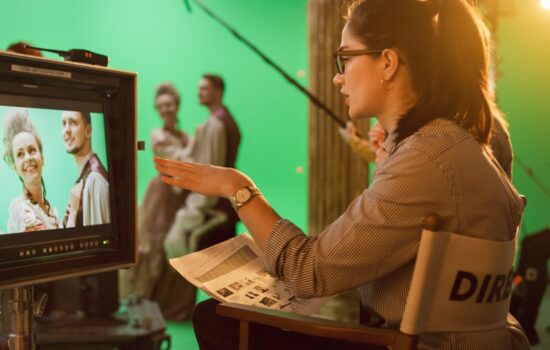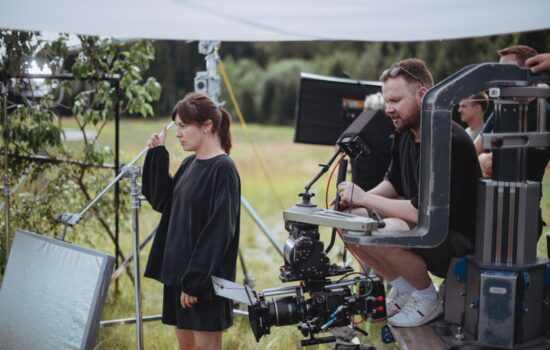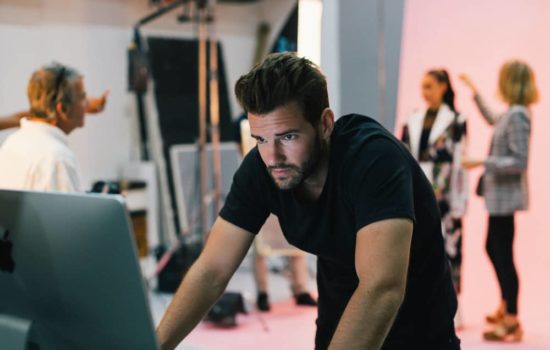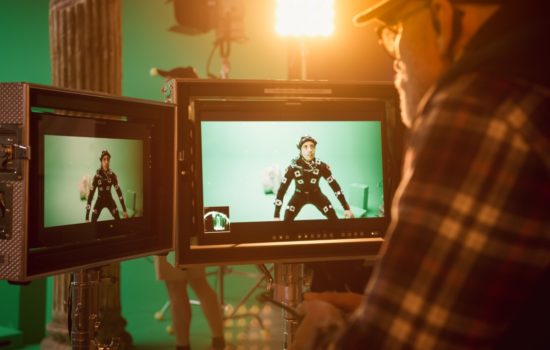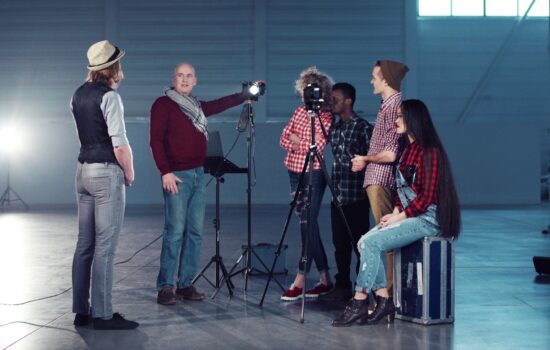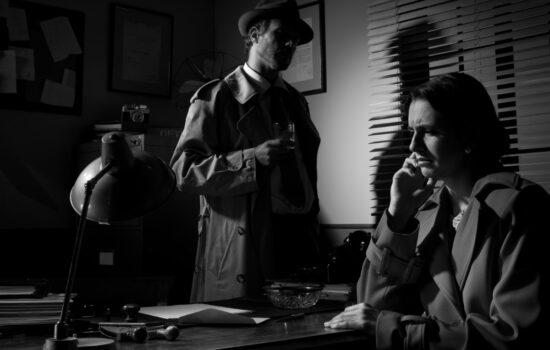Post-Production Coordinator
Career Overview
Post-Production Coordinators ensure delivery of a finished episode to the network. Duties include distributing daily footage to crew and production, scheduling Actors for post dialogue work, and organizing meals for post-production teams.
Alternate Titles
Post Coordinator, PPC
Avg. Salary
$53,2871
Salary Range
$40K – $70K1

How To Become a Post-Production Coordinator
People also ask
Career Description
Zachary Garrison, Post-Production Coordinator on A Million Little Things on ABC, explains that there are three different types of Post-Production Coordinator (PPC): “You can work as a PPC for a television show, a studio or a feature shoot. A studio position has a more corporate feel, features have smaller Post Departments so you take on more responsibility, and then there’s TV post-production where I work.”
Garrison goes on to describe the core of his position: “I work with the whole post-production team to ensure that information is communicated to the correct people, that we hit our deadlines, and that, ultimately, we deliver a finished episode to the network for air.”
The day-to-day is varied, but certain aspects are regular, says Garrison: “I usually arrive at the office at 9 am and send the footage shot the day before (the ‘dailies’) to our Director, Producers, crew and any appropriate people at the studio and network. We use an application called PIX to ensure this potentially clunky process is well streamlined.”
Alongside various unforeseen tasks that crop up throughout the day, lunch and dinner always have to be taken care of.
“If post-production personnel need food, and if there’s no Post-Production Assistant, the Coordinator will be responsible for picking up lunch and dinner. This is by no means a dreaded task — often the higher-ups find it difficult to leave the office — ensuring they’re well fed and watered is vital! Dramas usually have a Post-Production Assistant but if you’re a Coordinator working on a comedy, you’ll likely be picking up lunch and dinner,” explains Garrison.
Garrison goes on to detail more daily tasks that pop up throughout the day: “Often on set crew will want to see a specific batch of dailies to prepare for a scene they’re about to shoot, or the Showrunner will want you to send the latest cut to a new Director on your show. Once, I had to send dailies to Elton John!”
Garrison clarifies that the “Coordinator” part of the title comes from being the point person if anyone has questions about delivery of footage or scheduling. He describes himself as a “junior handyman”: “In reality, we fix any problem. Post-production is an all-hands-on-deck operation and every show is different — this means Post Producers and Post Supervisors have different preferences in terms of which responsibilities they delegate.
“As a PPC, you take on the tasks your superiors are willing to give you (or the ones they don’t want)! These include taking the lead with dailies delivery, keeping track of the show’s visual effects workflow, handling billing and cost reports/accounting, and scheduling Automated Dialogue Replacement (ADR).”
“Scheduling ADR is my favorite part,” continues Garrison. “Once sound work begins on an episode, the creatives determine which lines need to be re-recorded or added. Once I have a list of the necessary Actors, I’m in charge of bringing them into a recording studio. This involves a lot of correspondence with Production, and I usually get to interact with the talent as well.”
It all amounts to a fast-paced and exciting environment. “Often I’m scheduling people who are out of town/abroad, and the recording needs to be completed within a tight deadline. Once the Actor is scheduled and everyone is ready, I attend the session with the Directors and Producers, serving as the point of contact when the Actor inevitably shows up late. It’s often an experience worth calling home about!” explains Garrison.
What does a Post-Production Person do?
What a Post-Production Person does depends on their role. Some individuals, such as the Post-Production Coordinator and Post Supervisor, take on more supervisory roles to ensure that multiple facets of post are carried out smoothly and quickly. Others, such as the Film Editor or Film Composer, have more specialized roles that adhere directly to those post-production needs.
Salary
The average annual salary for a Post-Production Coordinator is approximately $53,300. The salary range for Post-Production Coordinators runs from $40,000 to $70,000.
“A PPC on a network TV show is considered to be a freelancer,” explains Garrison. “You are dropped from payroll once your show is over — most of the time you can hop over to the next show with your boss who brings everyone with her/him. This is why a solid work ethic and a deep relationship with the people around you is so important. Otherwise, you won’t be going with them!”
He elaborates on the figures: “On a network TV show, you can expect to make the same amount of money each fifty-hour workweek — you’re paid overtime after that. Enjoy the overtime while it lasts because once you move up to Post Supervisor and Post Producer, you’re paid a flat rate each week regardless of how many hours you work!”
What happens if you work on multiple seasons of a show? Garrison answers, “If your show is awarded an additional season, you can expect a slight raise from the Studio.”
How much do Production Coordinators earn?
How much a Coordinator makes, whether they work in production or post-production, depends on multiple factors such as the budget of the project, their professional experience, and the number of gigs they get in a given year. That being said, the average annual salary for a Coordinator is around $48,000.
Hey, what do you think about trying our new Film Career HelperFilm Career Helper really quick? It’s totally free and could help get your career moving fast! Give it a try. It’s totally free and you have nothing to lose.
Career Outlook
Garrison feels post-production offers the best opportunity to have a life outside work. He articulates it clearly: “You work closely Monday through Friday with your Post Producer, Company Producer, Post Supervisor, the Editors, and the Post PA. We mostly pull ten-hour days between 9 am and 7 pm.
“In contrast, On-set Coordinators and PAs are regularly logging at least twelve hours a day. Of course, there are times when you receive phone calls and requests after hours or work well beyond ten hours in a day, but for the most part, it’s a 9-7 gig.”
Garrison relates that in network television, every series he has ever worked in began in mid-July and lasted until around February. “March marks the beginning of Pilot Season, where you work on a different project — a single episode — that requires many, many hours at the office over the course of two months. It’s a great opportunity to make extra money with all the overtime, and it’s a fun dynamic being part of the conception of a show. After a while, it starts to feel a little like ‘spring camp!’”
And what happens after that? “After the pilot, there’s usually a two-month hiatus before we start the whole process over again,” Garrison explains. “That’s your chance to take on any personal, creative projects — in my opinion, it’s a pretty sweet trade-off.”
Career Path
Garrison suggests there isn’t a one-size-fits-all path into post-production coordinating: “Everyone has a different story; my career began, like in most departments, by serving as a PA.” Before Garrison moved to LA, he searched IMDB Pro and found a movie, Lost and Found, filming in his area (Charlotte, NC). He ended up nabbing a PA gig on that shoot.
He lays out his journey from there: “The Director of that film was already working in Los Angeles, so she was my go-to advisor when I thought about moving to Los Angeles. Once there, I scrapped for work. It’s a competitive industry so I made constant phone calls, sent emails, and tried to squeeze through any door I could.
“The Director of Lost and Found was now working full-time in post-production so, after seven months of building my resumé, she set up an opportunity for me to work on her show, Galavant. I worked for two weeks on the second season wrap-up and did everything I could to be helpful and make a good impression.”
Garrison is clear that as much hands-on experience as you can get will stand you in good stead for any coordinating role: “The more I gain knowledge about show business, the more effective I become at my job. This is true from beginners to seasoned Coordinators. When I was a PA, I made it absolutely clear to my supervisors that I wanted to progress and become a Coordinator. I took on as much responsibility as my superiors were willing to cede to me.”
Ultimately, it’s all grist to the mill for Garrison, as he explains: “Eventually I’d like to produce/direct my own projects and the knowledge I obtain at work will only help me in that pursuit. Meanwhile, I strive to move up the post-production ladder as quickly as possible.”
Once again, Garrison is very clear that ANY experience is good experience. Specifically, “This even includes working in the Tour Department at a studio lot, like I did. The Warner Bros Studio Tour hires a fresh group of seasonal people every year — it’s a clever way to get a recognizable name on your resumé and be in contact with people who can help you get jobs.”
He highlights a number of places worth checking out to build your all-important experience: “A lot of people post in Facebook groups about Post PA gigs on low/no-budget films — get stuck in there and see who you meet.”
Once you’re in, Garrison has some personal tips to share: “Pay attention, look to learn new things, and take on as much responsibility from your Post Coordinator as you possibly can. That way, you will put yourself in a position to move up to a coordinating role.”
Garrison also thinks it pays to make your aspirations clear to your coworkers: “Not only will they be aware that you’re trying to grow in your role, and offer you more responsibility, they’ll also be more understanding if you need to move on, and maybe even help you find that next job. As such, your development in your role as a Post PA is absolutely instrumental in eventually becoming a PPC.”
- “Check out IMDb Pro. Make phone calls, be bold, and have your resumé to hand. This is how I got my start, and it’s a great resource for somebody who doesn’t have any contacts.
- Go with a ‘do anything’ mindset. And do it with a smile on your face. Really, it’s just about being a team player.
- Please don’t sit back and expect people to hire you because you have a college degree from a well-known university. Make phone calls and write emails to as many different production companies, Producers or any potentially valuable contact possible.”
Experience & Skills
Garrison has some advice for anyone looking to coordinate: “Organizational skills and paying close attention to detail are crucial. There is a lot of information swirling at any given moment so it’s important to be able to manage it all without getting overwhelmed. Checklists, spreadsheets: any way you can keep track of everything effectively will prove incredibly useful.”
Experience is the key to breaking in, Garrison proffers: “When people ask me how to land a job as a Post PA, I advise them to build up as much production experience as possible and not to be afraid of working for free. You’ll be a better prospect if you’ve been a Set PA even on a couple of super-low-budget student films. Not only will it boost your resumé, but you’ll meet people on set who may help you land your next gig, and beyond.”
When it comes to post-production coordinating, Garrison points out the need for humility and positivity: “Even though a Coordinator is not a PA anymore, I think anyone at this level would benefit from having a humble, bright attitude and an intention to ‘serve’ the department. This means being friendly and happy to help with any task no matter how big or small.”
Garrison is careful to point out, “This doesn’t mean you need to bend over backward constantly to attend to your coworkers’ every need (you’ll be busy with other things), but a little does go a long way. Don’t be afraid to take out the trash — it pays to be a good person in general, but it pays in a literal sense here because once your show ends, the people you’re working with will want to hire you again.”
What skills do you need for post-production?
Post-production requires the people working in it to both work well with others, as collaboration and communication is central to this phase, as well as work diligently and rapidly on their individual responsibilities. Given that there is a lot of waiting mixed with pressure to deliver quickly when needed, anyone working in post-production must also have tremendous patience and the ability to work calmly during those high-pressure times.
Education & Training
Garrison has promising news for anyone keen to step into a PPC role: “I think it’s certainly helpful to have a college degree,” he says, “but it’s by no means necessary. PPC work is closer to an office-type job — if you can find an entry-level PA gig, you can learn everything you need by being eager to learn and paying attention to what’s going on around you.”
Additional Resources
Garrison points out two fantastic online resources for those aspiring to be a Post-Production Coordinator: “The first place is Facebook. There are plenty of “I’m looking for a PA!” Facebook groups — as I’ve mentioned, working as a PA is the entry-level step towards becoming a PPC.”
He goes on to mention industry-favorite IMDB Pro: “IMDB Pro is a paid subscription, but it allows you access to a lot of valuable information such as contact info, movies heading into production and all the key players.”
His final suggestion comes with a wink: “Check out CareersInFilm.com, the ultimate guide for anyone interested in learning more about how the film industry works, and how to get your start!”
FAQ
What is the single biggest suggestion you would give to someone wanting to get into this career?
“My overall suggestion for anyone looking at post-production coordinating is to approach it with a positive attitude and an open mind. Go in with the intention to work hard and a desire to serve. If you go above and beyond, remembering that actions speak louder than words, you’ll be just fine.”
What’s the #1 mistake people make when trying to get into this career?
“I think people expect their phone to ring — you have to be active in your search for work, particularly at the entry-level.”
What is the question people should ask about this career but rarely do?
“People rarely think about the distinction between feature, studio and television post-production. Each has a completely different feel and work rhythm. Some enjoy the corporate security of a studio role, others prefer the rough and tumble variety of television post.”
If you could describe in one word what makes you successful, what would it be?
“Positivity.”
Sources

Zachary Garrison
Zachary Garrison is a Post-Production Coordinator at The Walt Disney Company/ABC. He graduated from Clemson University in 2015 with a B.A. in Communications Studies, minoring in Film Studies. He transferred to LA a few months after graduation with no job and no apartment. He scored a seasonal position in the Warner Bros. Tour Department and, in between stints there, he worked any Set PA gig he could find.
Eventually, he landed a job in post-production on the second season of ABC’s Galavant. Since then, Garrison has worked on network television shows such as Pitch (FOX), This Is Us (NBC), Great News (NBC), Grownish (Freeform), A Million Little Things (ABC), and others.
References
- 1Multiple. "Post Production Coordinator Salaries in United States". Glassdoor.com. published: Dec 6, 2019. retrieved on: Dec 15, 2019
